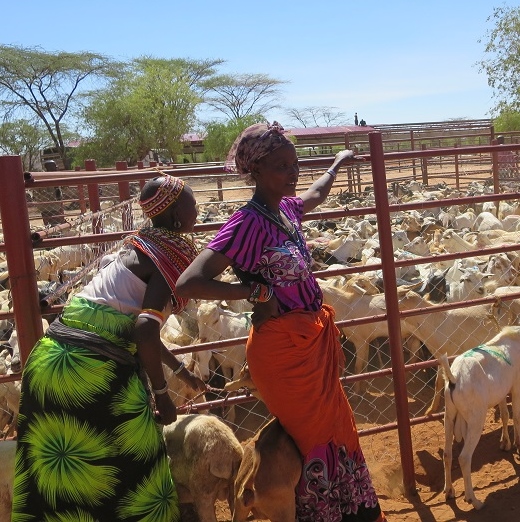Stakeholder platforms: connecting actors in supply chains
 In RELOAD, we use multi-stakeholder platforms to improve communication and coordination among people whose activities make up a specific food chain. In Northern Kenya, for example, the focus is on people involved in the pastoral meat supply chains.
In RELOAD, we use multi-stakeholder platforms to improve communication and coordination among people whose activities make up a specific food chain. In Northern Kenya, for example, the focus is on people involved in the pastoral meat supply chains.
Particularly for pastoral producers, small stocks of sheep and goats serve as an important component of a household’s livelihood strategies, particularly during dry periods and droughts to augment cash income and food. However, gaps in the flow of information among market partners can create economic losses ─ for example, when a Nairobi based broker spreads "favourable" information on the market to local traders in multiple areas, the resultant rush to bring animals will glut the market and create low prices.
PhD student Guyo Malicha Roba brings together livestock producers, local traders, local butchers, as well as representatives from livestock marketing groups, local brokers, county government representatives and other stakeholders with the aim to improve coordination for enhanced livelihood benefits among communities that rely on goats and sheep in Northern Kenya.
After a series of preparatory meetings, a multi-stakeholder platform (MSP) was launched on the 17th of September, 2015 in Korr in Marsabit County, Kenya. The key objective of the MSP are to enhance levels of trust between different people involved in the chain, to share information, and to jointly generate solutions to identified problems.
The participating stakeholders engaged in an in-depth discussion about specific problems they face. For example, the local traders and producers were able to explain the effect of the County tax in relation to their profit margins to government representatives, and made the case that the rate should be reduced. The government representatives, in turn, explained the rationale for taxation, and how the local traders and producers benefit from taxes collected, which then set the stage for subsequent discussion on the rate and how tax rates were established, and why the current rate is challenging to both traders and producers.
The participants emphasized the importance of continuing such multi-stakeholder meetings and discussed possible agendas for future meetings. They found such meetings a beneficial way for joint learning and to establish collective strategy for seeking solutions. One participant described the learning as if, “… closed doors are opened with bright ideas”. With motivation to continue, a trader said: “We were in one place before this process, and now we are at a different level”.
Mr Roba’s PhD work on stakeholder processes in pastoral meat supply chains is being supervised jointly by Dr Margareta Lelea and Prof Brigitte Kaufmann, both based at the German Institute for Tropical and Subtropical Agriculture (DITSL), Witzenhausen, Germany. The transdisciplinary approach followed at DITSL has prospect of harnessing the knowledge of different actors along the meat chain with that of researchers. This also results into a possibility for more coordinated actions and collaboration.






